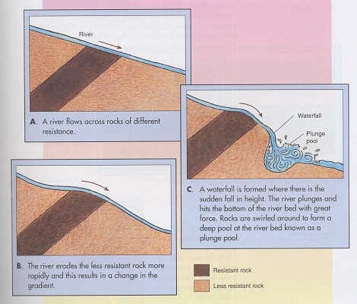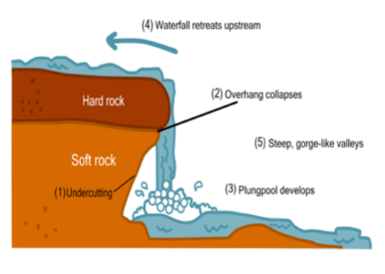Plunge Pool

Plunge Pool







As you look at the water spilling approximately 20 feet to the pool below, you may notice that the water is deeper near the waterfall (1) than it is further away (2). How did this happen? What produced this plunge pool?
Different Rock Layers Erode Characteristically
The sandstone under the falls is made up of layers with variable grain sizes and hardness. This variation affects the ability to resist erosion. Hard layers resist erosion and make steep walls at the falls. Steepness affects the speed the water will travel over that layer. Besides the steepness, there is less friction than with softer layers, especially if the angle of the slope is steep. The rapidly moving water then moves to the softer layer below and begins to wear away or erode that softer layer, creating a plunge pool.
Transfer of Energy
As this softer layer being eroded, the length of fall and its acceleration has increased which increases the force of erosion. This force or energy is transferred from the moving water to the plunge pool causing more erosion. If you observe the bottom of the plunge pool you will notice turbulent eddies in the water reflecting its high energy. The softer rock will erode faster than the higher layers and produce undercutting at the bottom of the waterfall. What other pieces of evidence do you observe that can help prove there is transfer of energy occurring? Remember, energy comes in many forms including motion, light, sound, heat, electricity, etc.

Migration of the Waterfall
As the lower, softer layer erodes the plunge pool will develop. The harder, more resistant rock will begin to extend out or produce an overhang, as in Figure 2. The weight of this heavier, more resistant rock will eventually succumb to gravity and collapse to the plunge pool below. When this occurs the waterfall will migrate or move upstream extending the canyon and begin this process again.
Stats
name Plunge Pool, Hungarian Falls
location Hubbell, Michigan
KMZ download HungFallsGTour.kmz
subjects Faults
Author Joshua Ernstes
This work was supported by National Science Foundation award #0831948.
1. The Fault 2. Dam 3. Crossbedding 4. Potholes 5. Plunge Pool 6. Bigger River? History



